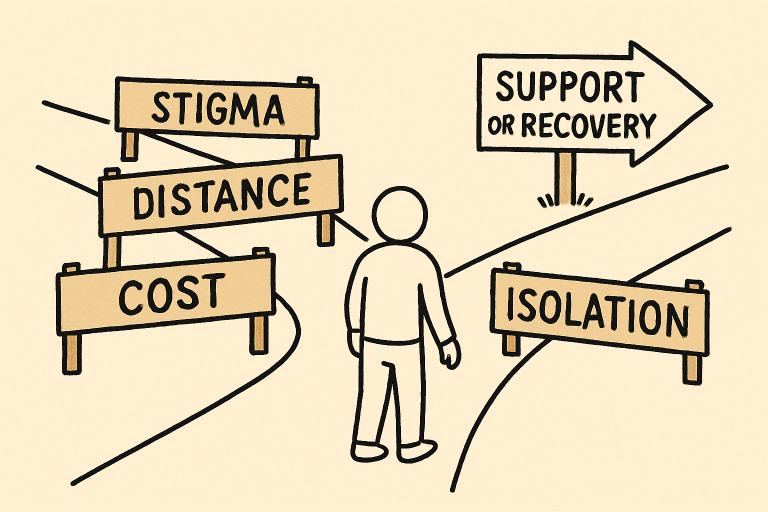
Embarking on the journey to recover from substance abuse is an act of courage, yet the experience is often fraught with significant roadblocks. From social stigma to limited treatment options, individuals seeking a healthier future must navigate a complex landscape. Comprehensive and supportive care, such as addiction treatment Yorktown Heights, NY, plays an essential role in guiding individuals toward lasting recovery. Addressing these barriers with empathy and evidence-based strategies can make all the difference along the way.
One of the first and most persistent challenges comes from societal judgment. Stigma can severely impact self-esteem and prevent individuals from seeking the support they need. Equipping communities and families with a greater understanding goes hand in hand with developing robust support systems. As more people become aware of the multifaceted nature of addiction, the hope is that recovery will become a less isolating journey.
Another significant obstacle involves practical challenges, such as financial barriers and limited access to specialized care. Geographic constraints can make in-person treatment difficult, but advancements like virtual counseling and telehealth are bridging the gap. With community-based programs and innovative solutions, even those in rural or underserved areas can access essential resources and support.
For many, recovery is further complicated by co-occurring mental health issues or the absence of social support. Integrated treatment approaches that address the whole person have been found to yield stronger, more sustainable outcomes. Ultimately, successful recovery requires a combination of medical expertise, emotional support, and community engagement.
Stigma and Social Perception
Stigma remains a formidable barrier in the path to recovery from substance use disorders. People affected by addiction often face social exclusion, shame, and discrimination, which can deter them from seeking help or sharing their struggles with others. Open dialogue within families, workplaces, and communities can significantly reduce feelings of isolation, making it easier for individuals to embark on and remain committed to their recovery.
Limited Access to Treatment
Many individuals with substance use disorders encounter access problems due to their geographical location, lack of transportation, or scarcity of qualified treatment facilities. This is particularly acute in rural communities, where services for addiction treatment may be hours away. The rise of telehealth has provided new hope by connecting people with counselors and support groups remotely, overcoming barriers posed by distance or mobility issues.
Financial Constraints
Affordability remains a primary concern for many seeking recovery. The costs associated with detox, inpatient, and outpatient programs can be daunting. Even though insurance coverage for addiction treatment has expanded under recent healthcare reforms, significant out-of-pocket expenses persist, creating a barrier for the uninsured or underinsured. Exploring sliding-scale payments, scholarships at nonprofit organizations, and state-funded resources often makes treatment accessible to more individuals, ensuring that finances do not stand in the way of care.

Co-occurring Mental Health Disorders
Mental health struggles frequently accompany substance use disorders. Issues like depression, anxiety, or untreated trauma can make recovery even more challenging if not addressed together. As noted by Psychology Today, co-occurring disorders require comprehensive, coordinated care to ensure both conditions are treated effectively. Integrated treatment that simultaneously tackles both mental health and substance use is crucial, greatly improving the chances of sustained recovery. A trauma-informed approach, which acknowledges the impact of adverse experiences, has shown promise in breaking the cycle of relapse by creating safer therapeutic environments.
Lack of Social Support
Social support is a cornerstone of recovery, yet many find themselves cut off from family or friends as a result of addiction. Peer support groups, mentorship programs, and community-based organizations can fill these gaps, providing pivotal encouragement and practical advice. Positive social networks not only alleviate loneliness but also reinforce accountability, help cultivate healthy habits, and reduce the likelihood of setbacks.
Relapse Prevention Strategies
Relapse is a common part of the recovery process, but it can be minimized with the right tools. Building effective coping strategies to confront stress and triggers is key. Evidence has shown that cognitive-behavioral therapy (CBT) and mindfulness-based interventions help individuals develop emotional resilience and maintain sobriety even under pressure. Ongoing participation in support groups such as SMART Recovery or 12-step programs also offers long-term benefits in relapse prevention.
Role of Technology in Recovery
Technology is an increasingly valuable ally on the road to recovery. Mobile apps offer motivational tools, guided exercises, and instant access to peer support, all of which can be especially helpful for those in underserved regions. Online communities and digital platforms lower barriers to support, helping individuals connect with others on similar journeys. As telehealth expands its reach, technology ensures ongoing access to therapy and resources throughout every stage of recovery.
Conclusion
Overcoming the challenges of substance abuse recovery often requires more than individual resolve—it demands the collective strength of communities, advancements in treatment, and a willingness to challenge stigma. As society becomes more attuned to the complexities of addiction and more inclusive in its support systems, long-term recovery becomes an achievable goal for many. Continued progress depends on breaking down barriers, fostering accessible care, and supporting individuals at every step.






